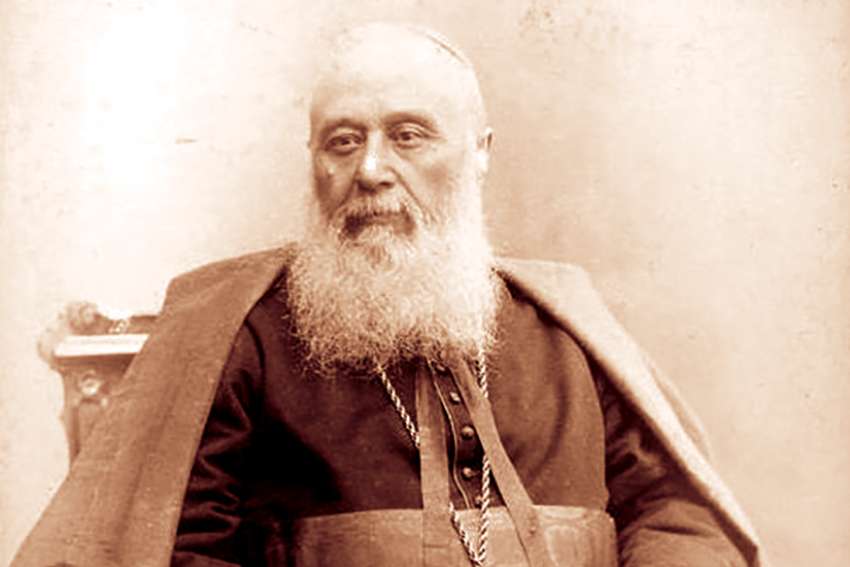But there is method to the madness for this missionary order that was established by the Frenchman Cardinal Charles Lavigerie in 1868 when he was Archbishop of Algiers (in Algeria) and Carthage (now Tunis, Tunisia). With a dream of converting Africa to Christianity, Lavigerie and those who followed him made it their mission to evangelize in parts of Africa not yet evangelized by building up a local Church and letting the local inhabitants bring it to fruition.
“We established a Church. We helped Africans to build up their Church and then we say, ‘We go now. You have your Church now, you take over and we move on,’ ” said Thévenot, the Bishop of Prince Albert in central Saskatchewan. “We are missionaries. People who work ourselves out of a job.”
Thévenot will be celebrating the year-long recognition of the 150th anniversary of the Missionaries of Africa and sharing some of his experiences at a Mass and gathering to follow Nov. 26 at Prince Albert’s Sacred Heart Cathedral. He said the celebration, first and foremost, will be about giving thanks to the Lord “for giving us these 150 years of evangelization.”
The order came to be known as the White Fathers not because of the colour of skin of these men and women (the White Sisters of the Missionary Sisters of Our Lady of Africa) but by the distinct habit they wore. Their white gandoura (a tunic) and burnoose (a hooded cape) closely resemble the traditional clothing worn in North Africa where the order can trace its origins. Under Lavigerie, its first missions were in northern Algeria and from there spread first to East Africa and then West Africa.
They weren’t the first missionary order in Africa, but the White Fathers were among the first — along with the Comboni Missionaries out of Italy — to take their evangelizing mission to the interior of the continent. Its members founded the first Catholic missions in East Africa’s Rift Valley lakes region from Ethiopia in the north and on south to Malawi in 1878, and kept at it despite great physical suffering, disease and persecution in the area. Almost two decades later, the order extended its mission westwards, beginning in 1895.
Lavigerie overrode the local government’s disapproval of doing missionary work among local Muslims and went on to establish villages for orphans. For his efforts, Lavigerie would be elevated to cardinal in 1882 by Pope Leo XIII, who two years later named him primate of Africa. The order would finally be approved by Pope Pius X in 1908, 16 years after the death of its founder.
Thévenot credits the long-lasting legacy of the order to its conscious efforts to not associate in any way with the colonial powers in the race to divvy up Africa and its natural riches. There was a distinction among Africans about the White Fathers: They were the fathers, not the colonialists.
“We came to establish a Church. We weren’t here to take the intellects of Africa and bring them to Europe or our congregation,” he said. “It was for them. It was to establish religious congregations, African religious congregations, African clergy, as well as eventually bishops.”
That is seen in the African Church of today, where Africans are evangelizing Africans.
It can be seen in the White Fathers mission going forward as well. The order, with about 1,200 members worldwide (112 in Canada), has a presence at the United Nations working to ensure Africa is respected as a collective made up of many different nations, said Thévenot.
“We have to get away from this colonialist bit of power which some countries have towards Africa,” he said.
As to what attracted Thévenot — born and raised in rural southern Manitoba, not far from the American border, he would spend 15 years in Tanzania — to the order, it was visiting White Fathers to his parish who would replace the local parish priest when he was on vacation. They would share their stories of working with the poor in Africa and that touched a nerve with the future bishop. His interest was further developed by a White Father who was close friends with the superior at the junior seminary at St. Boniface Thévenot attended who would share similar stories.
“We just do our ministry and what we are trying to build is communities of people that want to give witness to the world the love of God,” said Thévenot, who has served on the order’s General Council and was Provincial of the North American Province. “That’s really what our ministry is all about, to work in dialogue with the Islamic people and the other religions we find in our world today.”
Thévenot said the evangelizing spirit of the White Fathers remains with him to this day as he continues to serve in the Prince Albert diocese.


